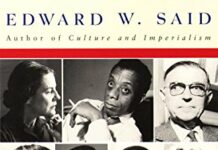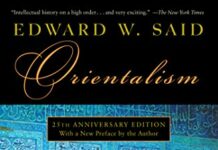
Ebook Info
- Published: 1996
- Number of pages: 144 pages
- Format: PDF
- File Size: 4.85 MB
- Authors: Edward W. Said
Description
In these impassioned and inspiring essays, based on his 1993 Reith Lectures, Edward Said explores what it means to be an intellectual today. Are intellectuals merely the servants of special interests or do they have a larger responsibility? In these wide-ranging essays, one of our most brilliant and fiercely independent public thinkers addresses this question with extraordinary eloquence. Said sees the the intellectual as an exile and amateur whose role it is “to speak the truth to power” even at the risk of ostracism or imprisonment. Drawing on the examples of Jonathan Swift and Theodor Adorno, Robert Oppenheimer and Henry Kissinger, Vietnam and the Gulf War, Said explores the implications of this idea and shows what happens when intellectuals succumb to the lures of money, power, or specialization.
User’s Reviews
Editorial Reviews: Review “Bracing and heartfelt. . . . A fiercely assertive description of the intellectual as an oppositional figure.” –The New Yorker “Edward Said is the most distinguished cultural critic now writing in America.” –Cornel West”Said is a brilliant and unique amalgam of scholar, aesthete and political activist. . . . He challenges and stimulated our thinking in every area.” –Washington Post Book World From the Back Cover Celebrated humanist, teacher, and scholar, Edward W. Said here examines the ever-changing role of the intellectual today. In these six stunning essays – delivered on the BBC as the prestigious Reith Lectures – Said addresses the ways in which the intellectual can best serve society in the light of a heavily compromised media and of special interest groups who are protected at the cost of larger community concerns. Said suggests a recasting of the intellectual’s vision to resist the lures of power, money, and specialization. in these powerful pieces, Said eloquently illustrates his arguments by drawing on such writers as Antonio Gramsci, Jean-Paul Sartre, Regis Debray, Julien Benda, and Adorno, and by discussing current events and celebrated figures in the world of science and politics: Robert Oppenheimer, Henry Kissinger, Dan Quayle, Vietnam, and the Gulf War. Said sees the modern intellectual as an editor, journalist, academic, or political adviser – in other words, a highly specialized professional – who has moved from a position of independence to an alliance with powerful institutional organizations. He concludes that it is the exile-immigrant, the expatriate, and the amateur who must uphold the traditional role of the intellectual as the voice of integrity and courage, able to speak out against those in power. About the Author Edward W. Said was born in 1935 in Jerusalem, raised in Jerusalem and Cairo, and educated in the United States, where he attended Princeton (B.A. 1957) and Harvard (M.A. 1960; Ph.D. 1964). In 1963, he began teaching at Columbia University, where he was University Professor of English and Comparative Literature. He died in 2003 in New York City.He is the author of twenty-two books which have been translated into 35 languages, including Orientalism (1978); The Question of Palestine (1979); Covering Islam (1980); The World, the Text, and the Critic (1983); Culture and Imperialism (1993); Peace and Its Discontents: Essays on Palestine and the Middle East Peace Process (1996); and Out of Place: A Memoir (1999). Besides his academic work, he wrote a twice-monthly column for Al-Hayat and Al-Ahram; was a regular contributor to newspapers in Europe, Asia, and the Middle East; and was the music critic for The Nation. Read more
Reviews from Amazon users which were colected at the time this book was published on the website:
⭐Arrived in a timely manner and in great shape. No issues to be addressed.
⭐For any person who wants to make a change in the world, question the status quo, this is where you should start. These pages are filled with words to live by.
⭐The most powerful book I have read.
⭐This was “required” reading for a college course. It was interesting and useful but it would never be on my “must read” list. It is well written.
⭐The 1993 Reith Lectures, compiled and adapted for print in this publication, are as close as Edward Said has ever gotten to writing a manifesto of his personal beliefs. ‘Representations of the Intellectual’ is a superbly incisive analysis of the social importance which intellectuals occupy. It culminates in an impassioned arugment for intellectuals to challenge common societal assumptions of what constitutes the norm by broadening their individual fields of interest and taking a greater interest in cultural and political history.The Annales School historian Marc Bloch once described the task of social historians as entailing ‘years of analysis for a day of synthesis’. This might well describe the extraordinary erudition of Said, who has always synthesised his encyclopaedic knowledge of politics and aesthetics – whether it be literature, classical music or the visual arts – into highly original works distinguished by their breathtaking interpretive ingenuity.Said’s critics, including the folks at ‘Commentary’, demur at the all-encompassing nature of his mind, to which the sheer quantity of his publications bears explicit witness. But as ‘Representations of the Intellectual’ demonstrates, Said views the role of the intellectual as being both public and professional; for him, it’s a role which naturally occasions shared knowledge in a public domain.Said is hardly Panglossian, though he is unapologetically idealistic, insisting that universities, even today, are a ‘quasi-utopian space’. The Humanities have clearly changed in the last couple of decades. Said celebrates the emergence of culturally inclusive literary theory such as feminist and queer studies, which accord with his personal understanding of intellectuals as critically engaged individuals not afraid to question populist rhetoric and speak on behalf of hitherto suppressed or unheard voices in society. Thus he rails against political correctness on both Left and Right – here, he includes zealous theorists who are infatuated with esoteric jargon and language games – so that, as the final chapter of ‘Representations of the Intellectual’ proudly proclaims, they might ‘speak the truth to power’.Said’s politics are uncompromisingly Leftist, and his vision of a world in which the vagaries of cultural difference are not merely tolerated but actively surmounted, only seems compatible with a multicultural democracy (which, Said realises, inevitably has its own share of problems. For example, he abhors the modern role of the United States as an ostensibly humanitarian interventionist. Utopia, indeed!) Yet he doesn’t actively seek to change the world. Rather, he wants to fortfy intellectuals with moral courage by encouraging them to embrace their individualism and social importance. In the end, the fact that Said has a social vision at all is just as important as its potential to be enacted.
⭐Edward Said is a distinguished professor of Literature at Columbia University. These are the Reith Lectures he delivered in 1993. He is a Palestinian Christian who has long been involved with issues of human rights there and around the world. Said deplores, here, the pressures and seductions of ‘professionalism’ on the intellectual in today’s society. He describes these as coming from specialization, from of the cult of the certified expert as he calls it, from coopting by social, educational or political agendas, and, from commercialization, which sees all ideas as a product in a market, held to standards of economic viability rather than truth. The intellectual, he argues, must rigorously maintain objectivity and espouse activism. An attitude of being outside the conforming principles of associations, even those by which the individual is defining himself, is the impulse to conscience which is the key message of this thesis. The obligation of advocating for what is ‘true’ or ‘just’ is implicit with this. Authenticity and spontaneity in assessing these issues are instilled first by developing that moral sense, secular and flexible, and applying it in the context of broad learning. Those are compelling and challenging standards, which anyone who aspires to the intellectual, in character or understanding (and that should include all of us) must aspire. One can then differentiate this from the burgeoning ‘intellectual industry’ of today, traders in credibility, mercenaries for whatever paradigm happens to be ascendent and expedient. Said’s own life attests to the influence one can have if honest to the concepts of universality, humility and integrity he discusses in these fine essays.
⭐A collection of six lectures given as part of the BBC’s prestigious Reith Lectures, this short book contains Said sees the intellectual’s role in society as that of a valuable outsider, one who can break down the stereotypes and categories that limit thought and communication. These thinkers are the ones that he believe can question special interests, corporate thinking, blind patriotism, even class or racial privilege. Above all, the intellectual is an exile and an amateur-that is, one consigned by choice to the margins. And one who can “speak the truth to power.”No stranger to controversy while alive, one cannot help but read biographical inferences in Said’s essays. He chooses figure like James Baldwin, Virginia Woolf, Henry Kissinger and Jonathan Swift that resisted money or power to uphold intellectual honesty and rigor of thought. They are also individuals whom social transformation was an essential goal-much like Said. Regardless of one’s attitude to Said’s own politics, this collection of lectures given a decade ago remain imminently pertinent and timely for discussion today.
⭐Great condition, great price. Thank you!
⭐How does one speak truth to power in contemporary times? Edward Said’s Reith Lecture focuses on how the role of the intellectual — that is, anyone who has been educated, or self-educated, to think critically about systems and concepts — has changed, and where it is situated in times where most intellectuals work for corporations instead of as independents. A review of intellectual and personal integrity that is beautifully-written and hugely important. I gave my first copy to a friend and am thrilled to replace it with this copy that is in terrific shape and was shipped rapidly.
⭐I ordered a few books by Said. All came in good time and excellent condition. They are well worth reading.
Keywords
Free Download Representations of the Intellectual: The 1993 Reith Lectures in PDF format
Representations of the Intellectual: The 1993 Reith Lectures PDF Free Download
Download Representations of the Intellectual: The 1993 Reith Lectures 1996 PDF Free
Representations of the Intellectual: The 1993 Reith Lectures 1996 PDF Free Download
Download Representations of the Intellectual: The 1993 Reith Lectures PDF
Free Download Ebook Representations of the Intellectual: The 1993 Reith Lectures



